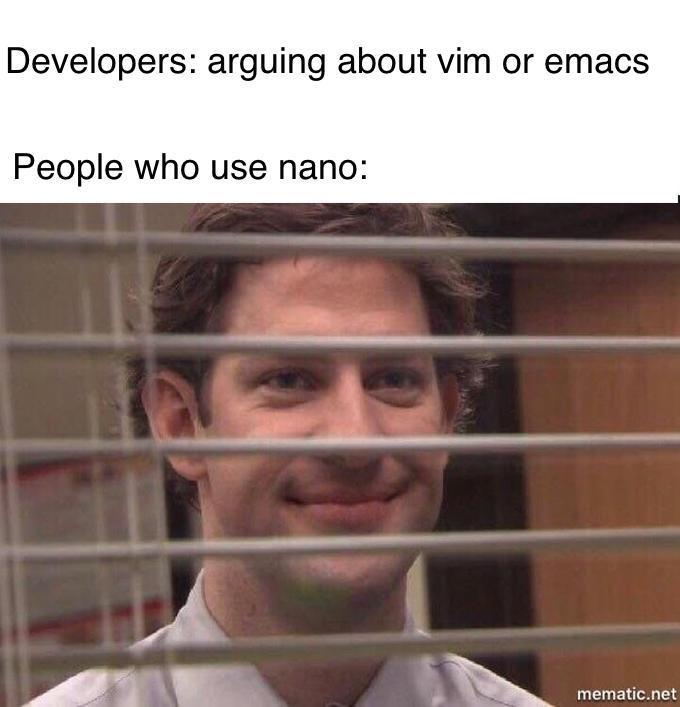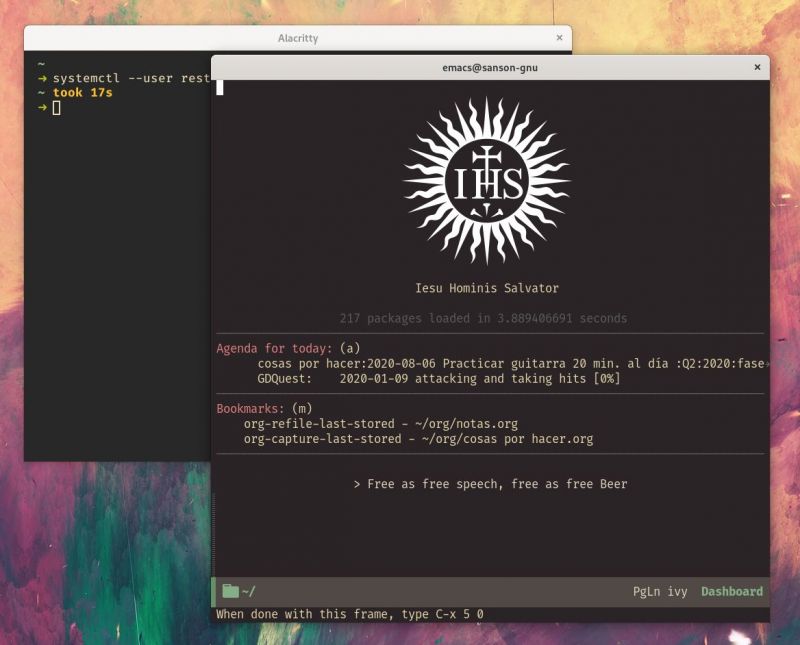Join devRant
Do all the things like
++ or -- rants, post your own rants, comment on others' rants and build your customized dev avatar
Sign Up
Pipeless API

From the creators of devRant, Pipeless lets you power real-time personalized recommendations and activity feeds using a simple API
Learn More
Search - "emacs"
-
-When using Windows
Butthurt Geeks: "You suck, use Linux!"
-When using Ubuntu
Butthurt Geeks: "You suck, use Arch! (or anything that isn't based in mainstream Ubuntu ) "
-When using Atom
Butthurt Geeks: "You suck, don't use the mouse!"
-When using Vim
Butthurt Geeks: "You suck, use Emacs!"
Really, do you always have to force everyone to use the toys that you are using?25 -
Colleague: "What is a pl file?"
Me: "Oh thats a perl script"
Colleague: "So how do I edit it?"
Me: "Just break out emacs and modify that perl script lol"
Colleague: " *Triggered* did you just assume my text editor preference"
Me:" -_- what year is this ??"25 -
PHP is a meme
Javascript is a meme
CSS is a meme
HTML is a meme
C is a meme
Everyone loves Python
Wordpress is a meme
.NET is a meme
Vim is a meme
Emacs is a meme
Apple is a meme
Microsoft is a meme
Windows is a meme
Having software available on Linux is meme
Stack Overflow is a meme
It doesn't matter what kind of developer you are.
Together we're one big meme.12 -
PHP sucks
JavaScript sucks
Python sucks
C sucks
C++ sucks
Apple sucks
Microsoft sucks
Linux based operating systems suck
Vim sucks
Emacs sucks
$IDE_OF_CHOICE sucks
Docker sucks
The way we talk about our tools makes we wonder why we do programming in the first place.23 -
Stallman heart failure recipe:
1. Start your UBUNTU LINUX(don't add the GNU part) and set up your .NET Core environment.
2. Download VS Code, the superior text editor for those that do not wish to have carpal tunnel.
3. Open the terminal inside your VS Code instance while inside a .net core project.
4. Type emacs -nw and watch emacs come to life inside of the terminal while living inside of the heretic vs code editor.
Wait for stallman to get a heart attack or a stroke from this.10 -
Windows vs Mac vs Linux
Swift vs Objective-C
Emacs vs Vim
GPL vs Apache License vs MIT license
Android vs iOS vs Windows phone*
Skype vs Facetime
GIF vs GIF
Peppermint vs Spearmint**
Men vs Women
I DON'T GIVE A FUCK!
IM HAPPY WITH WHAT I HAVE, SO STOP PREACHING OR I'LL STAB YOU!
Ok? 😑14 -
After Windows/Linux and atom/sublime and vim/emacs and all those other reasons we fight...
for(i = 0 ; i < 10 ; i++)
or
for(i =0 ; i <= 9 ; i++)
for 10 iterations?37 -
Dark Vaduck drinking beer instead of helping me to write a genetic algorithm for solving knapsack 0/1 problem ...
 5
5 -
Let's have a real debate.
Not Linux vs Windows vs Mac.
Not Vim vs Emacs.
Not ASP.NET vs Spring Frameworks.
NO.
CHARACTER LIMIT. 80, 100, or 120+ and WHY.26 -
Git. Not Linux, not python, not gimp, not GCC, not Emacs. Git.
Because it saves your work and you can work with other people on one project in a human way5 -
Started learning vim... It feels like a DIY IDE where you have to find half of the parts on the internet...7
-
I've been using Vim for like a year and a half, mainly because I dont know how to exit...
Just Kidding!
Ah, I miss Vim jokes3 -
People argue all the time what text editor is the best: VSCode, Sublime, NP++, Emacs, Nano, Vim, etc.
I just remembered when I used to do my HTML, CSS and JS in regular Windows Notepad, as a requirement in my Web Developement classes...
I think some good came from that, I picked up a habit of writing my code very neatly, easily readable.17 -
Vim users: You're the vegans of the programming world. No one cares that you use Vim.
Emacs users: You're to Vim users what vegetarians are to vegans.
Now, I'm not saying Vim is bad, or even that all Vim users are like that. I just roll my eyes every time I see someone bragging about how they use Vim.
If you wanna use Vim, use Vim. Just don't act like it makes you a superior coder.12 -
I’m gonna say it. I prefer Nano. Vim is nice and emacs exists but I just feel most comfortable in the hands of my precious Nano.27
-
If you really wish to be happy, find yourself someone who looks at you like Notepad looks at Emacs
 4
4 -
I learnt to navigate in Vim 🤩.
Ik it's not much. But had heard so much about Vim and Emacs (tho still don't know why are they so popular, or how to use them), but I kept my distance after the first time I could not quit the application.26 -
I know this is probably gonna be unpopular but whatever; fuck vim, fuck emacs! A text editor should by default take in standard accepted characters and command form the keyboard without being all hipster "I'm so niche and alternative" about it. You are a text editor so let me enter teeeeeexxxxt!!! Fuuuuuuuuuuuuck!!!!! $£^$%^^$%
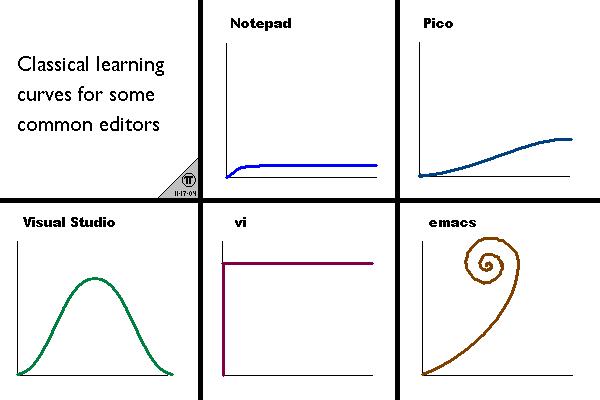 5
5 -
Just had a sudden "fuck it" moment and shaved my beard. I can already sense distrust in the face of people.
Am I banished from the church of emacs?1 -
Read some books
Get a computer
Write some codes
Use Linux
Hate Microsoft
Argue Vim vs Emacs
Debate 4 spaces vs tabs
Use dark themes
Follow buzzwords..
Now repeat after me, "I am a programmer...."2 -
Macbook Pro - No ESC key?
Its not like its used much in vi or emacs anyway is it?
No esc key on a unix box? Seriously?
I know its got a 'soft' escape key - hows it going to know to switch to that if i run vi or emacs -nw in an ssh session?
Mac keyboards go from bad to worse - used to be a nightmare to find a | symbol.10 -
My current workspace. Nothing fancy but it does the job. Tools: Windows 10, Emacs, Visual Studio 2015, git, bash.
 2
2 -
I've finally gotten everything on my Debian workstation configured they way I like it. Openbox + xfdesktop, tint2, compton & conky. The windows open in the screenshot are emacs, Tilix and ranger (URxvt).
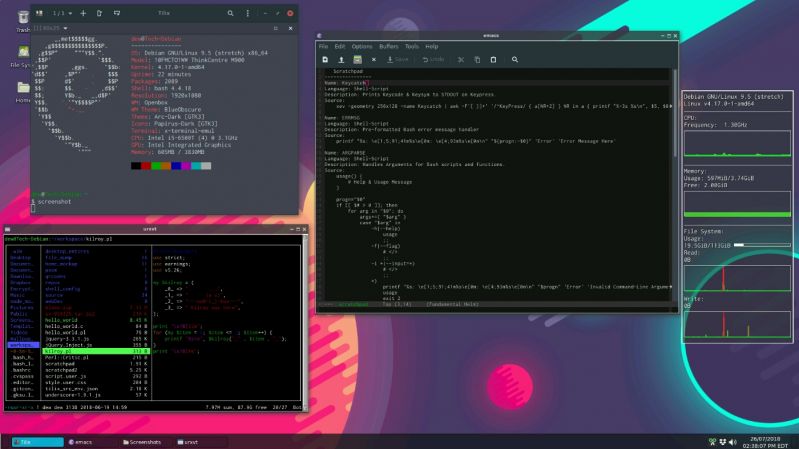 3
3 -
For anyone that is about that life, Vim 8.0 has been released, the first major Vim release in 10 years.
https://groups.google.com/forum/...1 -
I have a few questions:
How do you say "++" in your head:
https://www.strawpoll.me/17342756
Pronouncing "SUDO":
https://www.strawpoll.me/17342763
Vim or Emacs:
https://www.strawpoll.me/1734277117 -
I will leave it here
monday- tabs vs spaces
Tuesday- brackets indentation
wednesday- windows vs mac
Thursday- c# vs java
friday - windows vs linux
saturday- vi vs emacs
sunday- vs code vs intellij2 -
I know I'm gonna catch heat here but if you insist on using vim or emacs on any OS that is in GUI mode just know I think you are mental... I get it you have shortcuts but so do sublime, atom or vs code. Plus intellisense.
Don't get me wrong I started with vim and have a special place in my heart but I know people only use it to beat their chests.
And just so everyone knows a little about me:
Spaces>tabs
Vim>emacs>nano
Linux>windows>macOS
I hate JavaScript
And mtn dew is a better drink than coke or Pepsi.20 -
On Mac, open Terminal...
1. Enter cd ~/
2. Enter emacs
3. Press Esc
4. Enter X
5. Enter either; tetris, snake, or pong
6. Enjoy! 2
2 -
Emacs! Why?
Org-mode: Best note taking for work/life.
Magit: Git on steroids!
Evil-mode: Because Vim key bindings are far superior imo.
Elisp: The power to extend your editor however you want. -
React or Angular?
Vim or Emacs?
Tabs or Spaces?
.....
I'm fed up with these questions :(
Whatever is suitable for your job or whichever is comfortable for you, go with that...7 -
I'm having such a blast writing code in TypeScript. Once you learn it you cannot go back to regular JavaScript.6
-
Do any of you know about Dracula?
It’s this great looking dark theme that you have to check out!
https://github.com/dracula/...
Everything it supports:
alfred
atom
base16
bbedit
brackets
chrome-devtools
coda
conemu
emacs
gedit
highlightjs
hyper
iterm
jetbrains
kate
konsole
light-table
lightpaper
liteide
macdown
mintty
monodevelop
notepad-plus-plus
nylas-n1
pygments
qtcreator
quassel
quiver
sequel-pro
slack
sublime
telegram
terminal-app
textmate
textual
ulysses
vim
visual-studio
visual-studio-code
wox
xchat
xcode
xresources
zsh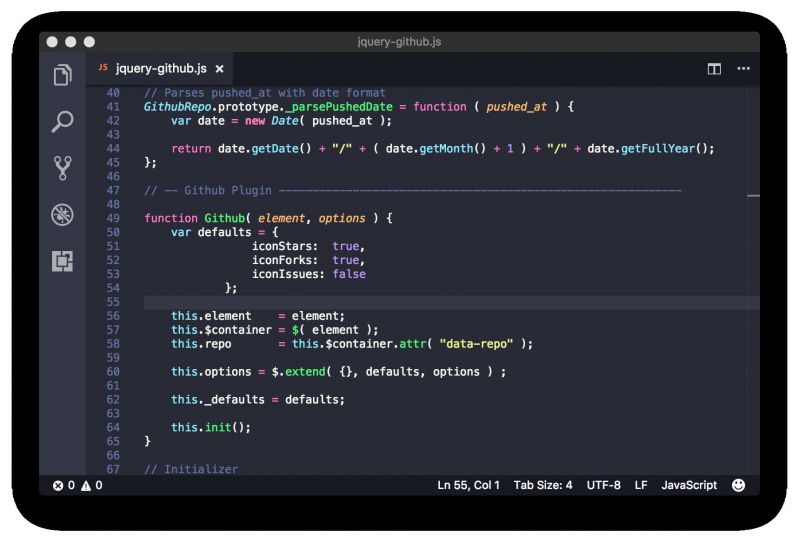 12
12 -
-I'm gonna learn C for real
-I'm gonna configure Vim
-I'm gonna try November
-Emacs with Evil mode is a better Vim
-I'm gonna learn eLisp
-I'm gonna learn functional programming
-Gonna use clojure for everything now!
-init.el is 400 lines long
int main() {printf("Hello World!");}
Success! 🤦♂️1 -
I really hate it when I try to be careful with disclosing information of my employer in a rant on Reddit but the CTO who fires me go there and replies in full detail in an attempt to shame you. http://archive.is/sfP00
Because I have bigger balls (or a small brain, depending how you see it) I'll leave the post on but with my response to his comment on my thread as anybody may dig my Reddit account before hiring me for a job.
And yes, he is the same guy I refer in this past rant https://devrant.com/rants/1089376/...
It fucking sucks that the CTO will sleep safe and sound and I can't do much than looking for another job and contribute to FLOSS projects while I build new stuff to improve my skills all this while money is running out. I'm glad I'm living with my parents after this shit hit the fan, less stuff to worry about, but this is not life.13 -
Senior[0]: emacs is the best text editor
Senior[1]: yeah, right. It literally stands for Emacs Makes A Computer Slow.
ME: GNU loves recursive acronyms, don't they?
Senior[0]: lol
Senior[1]: lol
ME: what?
Senior[0]: he obviously made it up
Senior[0]: no, I didn't. Use vim ffs. -
What's your favourite IDE? 😁
I'm currently working with Emacs and it's great! (But Sublime Text is still beautiful)20 -
when there's full-on nulear war in the kitchen between team vim and team emacs, and you're at your desk using sublime text and actually getting shit done.5
-
That's what we call "conf" in school. Normally we have to lock our computer everytime we leave the table. If we don't, anybody can reach your computer and make kind little bad things to your computer :
setxkbmap ru
alias ls="reboot"
alias firefox="firefox youporn.com"
alias emacs=" ls"
Changing keyboard sensibility and many things ! -
Yesterday, i had to use neovim for a task on my friend's laptop. There was no WiFi and I couldn't install Emacs. This guy uses Vim a lot. He recently moved to neovim from vim. He had some Ruby codes going. I had to debug some codes(performance issues). I was reluctant to work on it but i had to. After looking at some keybindings and the plugins that guy had written, using vim was pleasure. It was fast. I could shoot up multiple terminals work on that and was instant. I wrote some plugins to indent my code which worked as it's supposed to. I used spacemacs(as it's configured properly) Emacs but there is some load time on spacemacs and there are some issues shooting up multiple spacemacs on terminals. I had just configured and started using prelude which is beautiful Emacs configuration and is fast.
After using neovim that day something hit me that i had blindly had faith in Emacs without using Vim and i use Emacs only for text editing task and terminal. I don't use it for listening music, browser and other task i can always use modern browsers and Spotify for that. Modern browsers and music players are amazing and using those in Emacs there is always a lack of functionality and UI.(modern people don't use those i think and some Emacs users i know use stripped down version of Emacs i.e. microemacs or XEmacs.
I know vi is present by default on every Linux distribution. That keybindings are same as vim and it can be configured so, it is useful for embedded devices and system architecture. I love terminals and love working on tty. That's why i guess i felt instantly tempted to keep on using vim and i loved it's performance. I checked on evil layer before but there are some issues with evil layer in Emacs like it isn't too efficient like vim. I love lisp though and clojure can be edited nicely in Vim.
Is this sin against the church of Emacs? Should i join vi vi vi? I have already dedicated my life on Emacs (check my bio). Am i tempted by the devil? 4
4 -
decided to participate in a short c++ curse at uni, just to refresh my memory about it since it seems rather important.
Got sidetracked at the preparation task, which was the usual hello world...
I'm running this in emacs now...
Like, one view is the program and under it is the shell run from inside emacs...
I dunno why... send help?
Now I'm considering how can I configure the emacs shell in a fun way.. oh dear.7 -
VIM! ViM! vim! Vi Improved! Emacs (Wait ignore that one). What’s this mysterious VIM? Some believe mastering this beast will provide them with untold mastery over the forces of command line editing. Others would just like to know, how you exit the bloody thing. But in essence VIM is essentially a command line text editor at heart and it’s learning curve is so high it’s a circle.
There’s a lot of posts on the inter-webs detailing how to use that cruel mistress that is VIM. But rather then focus on how to be super productive in VIM (because honestly I’ve still not got a clue). This focus on my personal journey, my numerous attempts to use VIM in my day to day work. To eventually being able to call myself a novice.
My VIM journey started in 2010 around the same time I was transiting some of my hobby projects from SVN to GIT. It was around that time, that I attempted to run “git commit” in order to commit some files into one of my repositories.
Notice I didn’t specify the “-m” flag to provide a message. So what happened next. A wild command line editor opened in order for me to specify my message, foolish me assumed this command editor was just like similar editors such as Nano. So much CTRL + C’ing CTRL + Z’ing, CTRL + X’ing and a good measure of Google, I was finally able to exit the thing. Yeah…exit it. At this moment the measure of the complexity of this thing should be kicking in already, but it’s unfair to judge it based on today’s standards of user friendly-ness. It was born in a much simpler time. Before even the mouse graced the realms of the personal computing world.
But anyhow I’ll cut to the chase, for all of you who skipped most of the post to get to this point, it’s “:q!”. That’s the keyboard command to quit…well kinda this will quit the program. But…You know what just go here: The Manual. In-fact that’s probably not going to help either, I recommend reading on :p
My curiosity was peaked. So I went off in search of a way to understand this: VIM thing. It seemed to be pretty awesome, looking at some video’s on YouTube, I could do pretty much what Sublime text could but from the terminal. Imagine ssh’ing into a server and being able to make code edits, with full autocomplete et al. That was the dream, the practice…was something different. So I decided to make the commitment and use VIM for editing one of my existing projects.
So fired the program up and watched the world burn behind me. Ahhh…why can’t I type anything, no matter what I typed nothing seemed to appear on screen. Surely I must be missing something right? Right! After firing up the old Google machine, again it would appear there is this concept known as modes. When VIm starts up it defaults to a mode called “Normal” mode, hitting keys in this mode executes commands. But “Insert” entered by hitting the “i” key allows one to insert text.
Finally I thought I think I understand how this VIM thing works, I can just use “insert” mode to insert text and the arrow keys to move around. Then when I want to execute a command, I just press “Esc” and the command such as the one for saving the file. So there I was happily editing my code using “Insert” mode and the arrow keys, but little did I know that my happiness would be short lived, the arrow keys were soon to be a thorn in my VIM journey.
Join me for part two of this rant in which we learn the untold truth about arrow keys, touch typing and vimrc created from scratch. Until next time..
:q!4 -
When you think about a so complex algorithm for your project that you don't think anyone did this before but find the perfectly fitting solution on the internet
 3
3 -
First course of "Software Engineering", it is full of project management ...
I'm so disappointed ...4 -
Clojure developers: why has our awesome language not taken the world by storm? how do we get new developers interested in Clojure and Lisp! its not as hard as people make it out to be!!
Also Clojure developers: Yeh so we know you are all probably not used to an editor like emacs *crowd looks in confusion*....BUT YOU NEED TO DOWNLOAD EMACS, INSTALL ALL THESE PLUGINS, MAKE SURE THAT THIS SHIT CALLED CIDER WORKS AND LEARN ALL OF THSE CTRL+<Fuck-Mx-You> COMBINATIONS!!
As someone that has been in the community for so long...I can't with the mentality of some of these people, and it scares me because I fear for Clojure disappearing.17 -
So I'm a new CS student diving head first into programming. I've already made my choice in terms of what language to learn and indent style (bracket gets its own line 😁), but I'm having trouble choosing between vim and emacs...
Without this devolving into a flame war, could we have a discussion on the pros and cons of each editor? I'm curious to see what other developers use and their experiences with each of these editors.28 -
Y'all Vim (anti)fanboyz be like "ha! try to exit Vim!"
And then there's me, Emacs fanboy... my first shortcut was to undo a change - Ctrl+Z. Guess who looked at the monitor like if he got a wet slap?
Note: it minimizes the window and I blinked right in that while. -
To everyone who wants a terminal editor but hates how overly complicated vim/emacs is:
Micro is like nano but with lua extensions and multiple tabs.2 -
New colleague comes to present himself. Sees me editing using key bindings, multiple buffers showing in Emacs, bash scripts running in separate terminal...
"I have no idea what you do around here, but I'm sure your a pro"
Seems like a smart guy to me.1 -
Developer problems:
6 different package managers to keep up to date.
Gem
Pip
Npm
Emacs
Homebrew
Aptitude
Good thing bash scripts and cron jobs exist5 -
was jobless for some time but in those days I was seeing this smoking-hot mulata friend of a cousin. After several visits and "movie days" I asked her out for dinner which, to my surprise because I'm a nobody, she accepted.
we went out and eat some tacos in her favorite soda around the corner. And we went out a second time IIRC.
needless to say, the money that paid that modest dinner with such amazona was earned working as a freelancer in PeoplePerHour doing junior-level stuff in Python, I learned the language during my four last years in high school.
ah, how I miss that girl 🤷♂️.4 -
I'm pretty sure someone has already asked this, but as this is not StackOverflow ...
Question: vim or emacs?13 -
Digital minds, ranked:
1. Skynet
2. GLADOS
3. HAL-9000
4. The OS from movie “Her”
5. GPT-4
6. GPT-3
7. Clippy from MS Word 2003
8. Half-Life 1 cockroach ai
9. a brain-dead Markov chain
10. human ai from cyberpunk 2077 beta
11. virtual therapist from Emacs
12. GPT-4o6 -
For all of our differences Tabs Vs Spaces, Emacs Vs Vim. There are two things that drive us. Computers and free promotional merchandise.1
-
Love when I'm using a tool and get "damn this is well thought out" feeling. Magit (Git client) for Emacs. Been using it for a couple of years and still get these awe moments.4
-
I've decided to change the key components of my Arch Linux system. Of course it's not gonna be quick but here's my plan:
i3 -> bspwm
VSCode -> GNU Emacs
What do you guys think?13 -
Having a crack at switching from vim to emacs, my understanding of the major differences are as follows
* departure from modal editing
* emacs provides a more comprehensive environment
* More powerful scripting capability,
* my pinky will complain,
* I might just about to enter a new church
Any advice for a newb? Hoping there's a few of you out there15 -
Know what is funny about the Lisp family of languages?
The most powerful is Common Lisp, the most useful by current standards is Clojure(since it can target the JVM as well as JS and I think the .net runtime)
Yet the most widely used by a laaaaaarge margin: Emacs Lisp
I just think that is funny.2 -
I quite often run untested scripts on production systems or hot fix JavaScript files on live using Emacs...2
-
No Rant:
I guess I will start a religous discussion with it but I want your opinion on what tool I should learn.
Vim or Emacs (or stay with my IDE)?
For all of my programmer life I used IDEs... From Eclipse over CodeBlocks over VS to IntelliJ.
But now I realized that I want to be one of the cool kids. And using plain IntelliJ is uncool. No matter how much I love this tool.
So now I want to invest some time into learning. I never managed to do much in Vim since all code-completions sucked ass, feedback on syntax errors was bad and I never saw how I could be any faster with that shit compared to what IntelliJ does for me.
Will Emacs solve all those problems? Will Emacs make me code 1000 times faster and make having a mouse useless?
Or am I just too dumb for Vim? Can Vim itself do what my IDE does for me? Will it make me look as cool as I want to be?
Or should I stick to IntelliJ and just install Vim bindings?
What is your opinion on Vim vs Emacs vs any IDE?8 -
Are vi/vim users vegans of dev community? Can we also add emacs users to the list? Bunch of degenerates if you ask me... 🤗34
-
Using vim without plug-in and writing my first ever python code (not "hello world") on it
Hail emacs!2 -
Besides firefox and emacs there is also Linux, the library emacs uses to interact with the computer hardware
-
When you use a Windows desktop and Linux laptop at the same time and try to undo with ctrl-z in emacs... This is going to be a long day1
-
(colleague) Are you still using Emacs?? why don't you use Sublime instead?
(me) Because I am a PERVERT and I god damn LIKE it (being pervert & Emacs)2 -
why the fuck those images wouldn't load? they come corrupt from K8S, but they are fine if I run the container locally, like... wtf? is Ingress NGINX doing something to them or did I configure something wrong?!
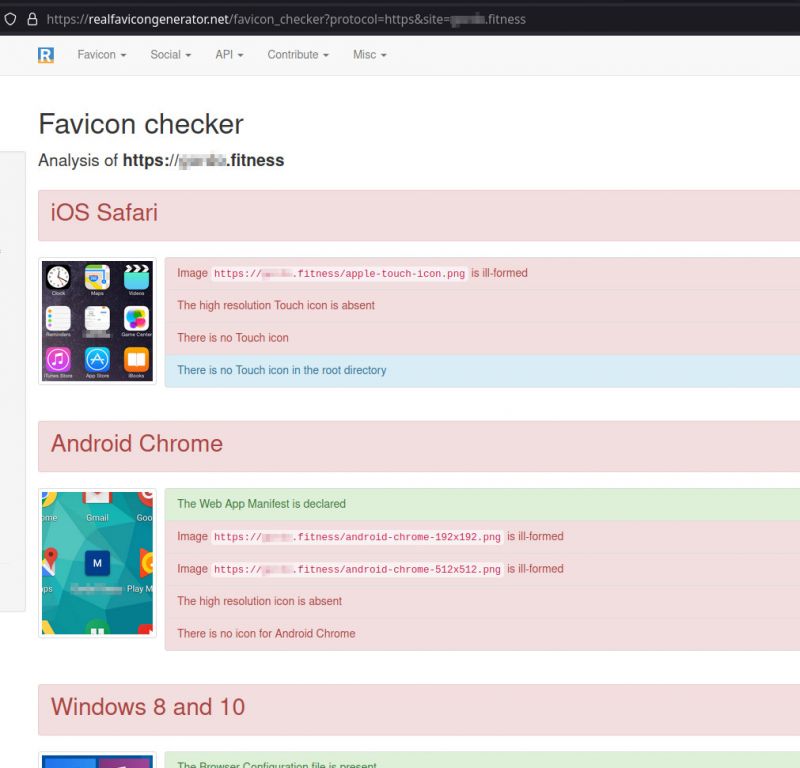 15
15 -
How did I end up looking how to write asynchronous function in shell script whereas my task is to write a distributed chat app in Node.JS ?
Damn this is going to be complicated. -
for the life of me I cannot figure out in my mind how to structure this project I want to start, and jumping right into coding does not improve this mental block.
At work this Golang code base has a clean architecture, so easy to maintain and extend, and I'm unable to replicate it on my own project(s). It sucks to be an ignorant.2 -
I finally got one of these boards, I still need to figure what to track on it, I already have a planner with me for my day to day
any suggestions? 10
10 -
So, I decided last week to give VIM and Emacs a try, for no other reason than I can.
I found emacs a bit clunky, but VIM is actually starting to grow on me.
Can anyone recommend some good sites where I can learn about configuring vim, nothing major, but setting different indents for different languages would be handy.2 -
Code editors as Doom skill levels:
coda = I'm too young to die.
notepad++ = Hey, not to rough.
sublime = Hurt me plenty.
vi = Ultra-Violence.
emacs = Nightmare!3 -
Depends on what I am doing, but for the most part: Emacs.
Closely followed by VSCodium and I then Vim.2 -
I can see the love for VS Code as a whole, or Codium (my main in that side)
But dear me, any moderately big project will make this bad boy choke the fuck out even on a powerful workstation. Atom is also out of the question for that, and does anyone even uses brackets? Elektron based apps tend to choke like this.
Thus, for simple editing tasks I have preferred Sublime, Notepad++ and Vim, Vim is always there for me.
But I am wondering about one more:
Anyone here with experience on using Emacs on large as fuck projects? how was the experience?
I have only used Emacs on small shit and it works fine.13 -
when instead of coding one spends far too much time on expanding the syntax highlighting for better readability...
I mean, yeah it took me like 2h, but now I have a vague idea on how to quickly add things which improve readability for me.
emacs config ftw. -
So I'm TAing this database class and we constantly need to use shell to edit text. I am hosting the workshop with another student, who is a vim user and I am an emacs user. During one workshop he wrote down the commands for editing and quitting vim, and I simply told them control x and controls s, then control x and control c. And the stdents are fucking complaining that is too many commands? Like, wtf? And this week when we are holding the workshop and we need to edit something so he said just open your favourite editor and a girl was like vim, vim, vim , the same girl who complained emacs is too many commands. Like I'm the total loser using emacs there. Get your shit together people omfg you brainless followers. No offense to vim users, this is just personal.1
-
Does anyone else accidentally use invalid keyboard shortcuts when doing something on a friend's computer? I use Emacs so everything is weird XD2
-
In a conversation about which editor to use to edit pod file, this guy said nano.
I thought what a great idea to piss off both vim and emacs people in a single shot 😂2 -
!rant
I love emacs dired mode.
Nothing better than the full power of a decent text editor to edit directory content.
I know quite some multi-file-naming tools, but they are all crap compared to dired.
That's all. Have a nice weekend, everyone!1 -
Am I the only one who seems to have trust issues when saving code in my text editor? Whenever I want to save I press Ctrl+X+S like 5 times just to be sure.
NB: Ctrl+X+S is equivalent to Ctrl+S in Emacs/Spacemacs1 -
I'm only a humble customer service representative in Amazon, I really hate the email editor we use to mail the clients after they call or chat with us. This, of course, means I need to include Emacs on my workflow so I can suffer less, let's Elisp the heck out of this problem!2
-
Ok. Vim is absolutely brilliant. But sublime in vintage mode ( sublime text with some of the vim capabilities ) is more brilliant. Today I just found out that this code editor (sublime) has this feature implemented and I'm happier than ever. I will use both of them and I won't need any over text editor ( although I have to try to emacs and spacemacs ).10
-
I've just fucked up my ssh config on one of my arch VM... Had to destroy it and make a new one ...
Fml -
Serious question, why do people prefer vim or emacs? I understand that they have alot of shortcuts and what not but so do other editor. Just curious. Don't kill me9
-
Integrated vterm package in Emacs, I'm glad having true-and-efficient terminal emulation inside Emacs
 2
2 -
Emacs, once you gotten familiar it's just the best and there's lots of packages to make everything easy to do from emacs. Also it's very configurable
-
I really wish Emacs had better integration with Windows. Vim is a wonderful text editor, but it just doesn't do everything I used Emacs for. If it were my choice, I'd only use Linux for everything, but unfortunately I have to use other people's computers since my personal system's hard disk is borked, and it's really unfortunate how poorly it works even with Cygwin. Oh well, can't have it all I guess.2
-
woman(package) definition by Emacs:
-"browse UN*X manual pages `wo (without) man' "
-"woman is a built-in package."
Emacs, pls... :D1 -
!rant
Emacs vs Vim? Why not both!
I found a gem of an editor called Spacemacs which combines the power of Emacs and the editing capabilities of Vim! Already replaced intelliJ with spacemacs for my scala and Java projects :)21 -
There is no system but GNU, and Linux is one of its kernels.
Sainthood in the Church of Emacs requires living a life of purity—but in the Church of Emacs, this does not require celibacy (a sigh of relief is heard). Being holy in our church means exorcizing whatever evil, proprietary operating systems have possessed computers that are under your control, or set up for your regular use; installing a holy (i.e., wholly) free operating system (GNU/Linux is a good choice); and using and installing only free software with and on the system. Note that tablets and mobile phones are computers and this vow includes them.
Join the Church of Emacs, and you too can be a saint!
People sometimes ask if St IGNUcius is wearing an old computer disk platter. That is no computer disk, that is my halo — but it was a disk platter in a former life. No information is available about what kind of computer it came from or what data was stored on it. However, you can rest assured that no non-free software is readable from it today.14 -
I really love Ubuntu Mono and similar fonts, because they're nice to look at while coding, so I tried to use it in Emacs.
Man, what it produced is just... disgusting! I couldn't see anything even in Ubuntu Mono "normal" version (not bold, not italic) with size 10 (my normal size).
In smaller size I almost couldn't recognize characters in code, in bigger it yelled at me I'm blind. Wtf emacs...6 -
Damn, mozart, i am trying to install it for the whole day, and now when i am able to finally install it, i dont know how to compile and run a piece of code in it. Why does anyone create such a language that works majorly on emacs, and also has no well enough documentation how to work with it, if by fluke someone installed it.2
-
I've always thought that emacs was just a text editor but... Emails? News reader? Web browser?
That's... awesome! What the hell...
https://gnu.org/software/emacs/...6 -
if I have to perform coding tests on CodeSignal, should be good enough to practice some hours on leetcode or hacker rank? I don't want to blow up this one, I need to job
-
Today I've experimented the windows' blue screen of death...
My windows partition was f*ck up.
I tried many fixes, like boot from grub (which very complicated), boot from a usb with ubuntu live version and run boot-repair.
Bit finally I ended up, make a live usb of windows 10, (tried 6 times before finding the good way to do it with uefi bios) and reset windows without deleting my personnal files.
I'm pretty much proud of me right now.2 -
Does anybody use a 60% keyboard? I want to buy this, https://annepro.net/products/...
Arrow keys with press of fn and no distinct function keys, but it seems doable. Will I have problems using this with emacs?12 -
boi, k8s is hard, even if it is managed by Digital Ocean. Is there something I can install on my droplet that can help me release software from my gitlab repositories?
I'm on Debian 10.114 -
dev = true
rant = false
post = " hey guys, I wanna make a photography portfolio website for my brother.
I want to change my habitual stack and go in uncharted seas.
My habitual stack : Nodejs, angularjs/Angular, bootstrap/foundation.
This portfolio should be SEO ready and lightweight.
Thank you if you have some ideas so I can enjoy learn a new stack 😃"
return post2 -
Emacs.
I dunno why but I feel at home while using Emacs. It is like, it provides everything I need.1 -
How do I become a consultant? Do I need to master some programming languages and programming patterns and get "know-how" beyond of the general population of software engineers?10
-
When instead of propperly coding one ends up adding syntax highlighting to emacs for specific terms and just other fancy functions...
I mean hey, it is somewhat more readable now I guess. 🤷♀️
...
Guess I'm just distracted and aoiding the issue ^^' -
Just firing up a new war which will be just as important in a few decades (if not today already) like Vim&Emacs.
So: Do you use 'string' or "string" in languages like JS, Python, ...? 8
8 -
"Per our conversation [Redacted] would like to do a Teams Video call with you to discuss RonR opportunity with us."
What's RonR? I'll interview for a backend software engineer position with an offshore company3 -
What are your favorite gui editor (not just vim/emacs in console) for Linux that are not based on Electron and that are doing well with several langs?8
-
FUCK. I'M DONE WITH THIS SHIT. CAN'T GET MY HEAD AROUND THIS.
My intelligence is limited to Java & Python.
NO VARIABLES, RETURN TYPES..NOTHING! JUST FUCKING MAGIC! AND ALSO, FUCK EMACS. undefined i should probably kill myself can't understand shit stupid me fucksell shit emacs fucking haskell and gofer2
undefined i should probably kill myself can't understand shit stupid me fucksell shit emacs fucking haskell and gofer2 -
I am planning on switching to debian, (one of the distros on my "distros-to-try-before-i-die" list.) I downloaded the net install image, what i wanna know is that, what is the average size of the downloads for a minimal.install? By minimal I mean just the bare bones debian with the drivers, python, gcc, emacs, and well i3? Can i pull it off under a gig? (Data limit on my network)7
-
https://youtu.be/JWD1Fpdd4Pc
Pretty good explanation of why emacs is great. I was an evangelical vim user until I came to realise these points.
TL;DR main point:
The editor is second to the powerful and extensible underlying runtime, that makes extensions far easier to make and thus provides a better ecosystem. Although neovim is making strides to fix this5 -
Crazy: I had this issue with vc-state reporting 'edited on a visited file even after all changes made were pushed to the remote Git repository in a commit. Looking for answers in Emacs Stackexchange I find someone having the same issue --in a different context-- but with no replies, the question passed unanswered like six months... until now!. Took me one minute this time (I have been dragging this during two years or so) to find out we had vc-refresh-state which solves my issue and the issue of OP in Emacs Stackexchange.
It was a matter of hooking it with some Magit's hooks and you are ready to go!. -
I expected this video about an emacs enthusiast to be crap but it was actually quite funny. Or maybe it's just me.
https://youtu.be/urcL86UpqZc2 -
In Unix everything does one thing and does it well. Except emacs which does everything really badly1
-
Never used Emacs in batch mode, did it today to transform some code generated by struct2ts (convert Golang structs to Typescript classes/interfaces).
I won't rely on sed/awk for complex stuff ever again, is much pain in the ass for me tbh.4 -
ORG Mode for Emacs - Best note taking application ever.
Does anybody else find it better than Evernote, oneNote like I do too ?5 -
I'll just configure Pulseaudio, bindfs and MediaTomb while that movie is download... Stupid Popcorn Time and stupid buffering
-
Following from https://devrant.com/rants/1516205/...
My emacs journey day 0-1
0: quickly realised what I was getting myself into, wow that is a learning curve. Head is buzzing with different key commands (and thank you to everyone who's helped out in my original post). I've been here before with Vim, but it's so hard when I am proficient with another editor, one of the most difficult aspects is getting it set up to even format my code appropriately (the right tab width etc), but I press on, something tells me it will be worth it in the end.
1: I come across a tutorial for clojure and emacs (https://braveclojure.com/basic-emac...), this looks good, oh sweet it shows how to load a good configuration, some more useful commands, feels like I'm getting there. Then it hits me, I manage to put my finger on why I decided to take the plunge: emacs isn't an editor at heart, at its heart is lisp. From its core it is scripted using one of the most powerful types of languages. Rather than some bolted on domain specific scripting language.
Now the real learning begins.2 -
!rant
Vim got me interested in efficient text editing but Emacs made me stay. I like both and use both, but for different things. -
So, I told the interviewer that my frontend skills are bad. He said that I should not worry as the tests where backend centered, good. Later, I got the job, now the interviewer, which happens to be the head of tech in the company I work for, has assigned me two tasks involving 99% of work on the frontend.
FFS, I've been searching on Internet and reading Kendo UI documentation for 4 hours to figure how to trigger the KendoGrid editable popup with populated data to enable the user to update such data. AAAAARGH!!!1 -
Emacs is the reason why I screw my own agenda for Saturday, but sweet baby Jesus the mode-line now looks H O T for sure1
-
After using emacs for almost 2 weeks, I can't tell you how many times I've pressed Ctrl+W, Alt+W and Ctrl+Y in things that aren't emacs.1
-
I want to use Emacs more and more for my development stuff. I feel fairly comfy while developing server side stuff (clojure, haskell, ...) but I can't find a good setup for the client side.
Has anyone here experience with Emacs and React? Is there a good setup where stuff like format document etc. works? Is it event worth using emacs for the frontend or should I just stick to vscode? -
Impulsive saving. I just cut a portion of newly written code (not committed), saved the file as a reflex, and accidentally closed emacs instead of switching window.
The environment should have had the cut in its clipboard, but nope. I should have a history of autosaves, but that doesn't seem to work as I expected.
Binding C-x C-c to null again :(
I have work to do on my .emacs.3 -
Ctrl+X followed by Ctrl+C to quit. Let that sink in. Think about :wq. Think about Ctrl+X. Think. Ask yourself how you think about it and then think again.
And if you say "well it's AWESOME" then start using your clipboard more when using a gui around the terminal or ssh and come back 1 month later.
People say vi is counter intuitive.. what the fuck is emacs then?2 -
Are emacs users really be like polishing their configs for years, for decades even? Emacs users of devrant, do you really end up with an ide that is more efficient than anything else? Is it worth it?2
-
last week I finished a course on k8s "simply, for developers". Today I decided to fiddle with kubectl to move a project I'm working on to k8s and it was a complete success (thing runs on minikube and pulls containers from a private Gitlab registry).
I'm happy with the results, there is still room for learning k8s and devops in general. -
Ok bois it's IDE / Text Editor time again.
I have had my fair share of usage with VSCode and i have been using VIM for over a year now.
With Vim i miss intellisense, class lookups etc.
VSCode doesn't provide the macro abilities i like in VIM and also doesn't support every edge case of file (giant files for instance).
Now i am at a certain dilemma. Do i use VSCode? Vim?
I am seriously considering trying emacs, but i don't know much about it.
What is your take on this?
Please respect each others choice, i don't want another fucking IDE religion war4 -
I used to like Richard until he said he likes Emacs more than Vim. What the f**k mahn, Luke seriously?2
-
After start reading on devrant I noticed that somehow people are using vim and emacs quite a bit. Why are you using them m? Are IDEs or Editors like Atom/Sublime not far more sophisticated than CLI Editors?11
-
Become the best developer I can. Contribute to open source. Master emacs. Make people take my skills and knowledge more seriously.
-
Back in the early 90's I never switched from vi to emacs, despite the peer pressure to do so
<ESC>
:wq
-
(Neo)Vim. Nothing comes close, except Emacs after 2 weeks of configurations, and even then it's not nearly as consistent and fast.
Vim is one of the few programs that don't try to be smart and "help" me, and has the best approach to custom keybindings I've ever seen. -
Hey guys and gals, hope everyone is well! very recently i have ventured into learning how to use Emacs! and i find it very interesting !, I'd like to know whats the best way of going about setting up my Emacs editor for Python 3? Before learning Emacs i have mainly been using visual studio and intellij Idea :-).
One more question I have a project idea i'd like to build for myself, I'd like to create a small program to keep track of my favourite stocks and essentially send me notifications or emails if a price has gone down or up :D, whats the best way to approach this? getting the data etc? I'd like to personally build this with my Emacs editor too!
Thank you for taking the time to read my question :D, really appreciate it!
Milo3 -
I worked on a game about or politicians sending home tourists, is a brawler. I'm still working on it tho.
-
Several months ago I was praising antd's forms but honestly I can't figure how to debug them with React Context Devtools, let alone do that inside React Storybook.
Unless I come up with a solution for this problem I'm a dead man.4 -
All you emacs cultists, share with me your wisdom. As someone who wants to learn how to use it I have a few questions.
what resources should I use to learn more about it and configuring it?
What's the difference between emacs, doom emacs and all the others I've heard about?
Are you able to and do you use the GUI or the CLI versions of it?
And are there any packages equivalent to VSCode's Intellisense?
please for the love of God don't turn this into a holy war of vim vs emacs I don't mind either I just want to try out emacs cause I think it looks awesome and something I'd be interested in.1 -
For a small team (<= 7 people) working on a self-managed Gitlab instance ('Starter' subscription), is it better if each user keeps a fork of the project they work on (working on other branch than master) or have everybody work on the same fork (still, different branches)?
Also, squash commits on branch merging, yes/no and why?4 -
I was just curious about this: how many of you guys uses emacs/vim? Is it your main editor or just for quick editing? Any specific reason besides familiarity?
I ask this because I'm a late adopter of emacs. It is my quick editor (I use jetbrains IDEs). Fell in love with mu4e and twitter-mode, but org-mode was the deal breaker.3 -
Had a dream that I remapped Copy to Command and Paste to Option, and it started a new vim-vs-emacs type war.2
-
You may have the latest IDE with all the cool interactions and what not, but knowing how to use either Vim or Emacs on the command line will take you super far in your dev career.
-
!rant
My "The rule of St. Benedict, as your Code of Conduct" repository has more stars than the repository of my Emacs configuration in Github, haha. https://github.com/saint-benedict/...1 -
Discovered AntD couple of weeks ago, now I'm on the way to re-write the frontend for a product I have, was checking their documentation, and I am astonished how great it is ant.design4
-
Trying to craft a capturing subtraction group without having a good grasp of regex... That's a bad practice, right?1
-
Hi folks,
I'm currently working on a project where I need to reassemble and play a video from chunks fetched on a server.
The chunks are created from an mp4 video file and with the help of the 'split' command in a terminal.
I can fetch and play the first chunk in a video tag. It displays the total length of the video and stops when the end of the chunk is reached.
But I cannot fetch the second one, somehow append it to the first one and play the newly created chunk.
I tried to concatenate the two chunks using arrayBuffer and Blobs but it didn't work.
Maybe the solution is with SourceBuffer ?
Let's find a way to do that !
Thanks you guys !1 -
Somehow mocking xhr requests (?) for Axios is really hard to make it work. I use React Cosmos as I'm re-doing the frontend of this already running in production and works great, but when my component communicates with the backend it breaks and I'm unable to test the full behavior.
Then, it occurred to me that trying to mock Axios may not be the best. So I came with this scheme where I would have a configuration variable with a default value and change that when I need to work with React Cosmos, which in turn changes the behavior of `/auth` to return a valid JWT in response to a GET, put an Axios interceptor in my outermost Cosmos decorator and BAM! suddenly was able to develop and test my React components closer to how they would work in production.
It surprises me how simple this endeavor was, and because everything runs orchestrated by docker compose things run smoother.
(this is not an excuse to not to learn how to deal with the mocking issues of Axios, after all I wont have a working backend every time I work in some frontend application)5 -
!rant
So, at this day I have two jobs as software engineer (I'm self thought). The first one with a friend from high school, a billing platform. The engineer he had flew to Canada and leave him with nothing, so I made one from scratch, I couldn't deliver on time and most of the clients he had moved to another services so the benefits of the deal I made with him ended being less than expected (there was a deadline set by our government as these clients are merchants and the Costa Rican IRS equivalent is moving everybody to electronic billing to mitigate tax evasion). The backend was done using Go, the front-end with React and MobX.
Then, the second job. I'm being staffed to a big outsourcing company for a North American business. The engineer team is small compared to the other departments and the people are really nice. Their stack is Python and React, I'm the only guy allowed to use a different editor than Neovim (Emacs in my case).
between the two I work 11 hours per day, and I'm satisfied with this.
This is way better than my old CS job at Amazon Spain where I couldn't use Emacs to have a decent text editing experience.
Thanks, Lord.2 -
anything weird is beyond vscode
anything weirder is beyond vim
nothing is weird to emacs
oh, emacs, one day... one day I'll ditch vim and let you pick me up -
Vim! Don't need all that shit that other editors bring with them. I like being able to choose everything I want, know it's installed on any box I go to, even over ssh with no gui, and I can write my own plugins if I can't find what I need.
And I don't have to break my fingers holding 17 modifier keys in emacs.2 -
I am confused.
I've been using nano to edit stuff for quite a while (mostly bash scripts)
I'd like to use the terminal for more stuff and move away from IDEs
I mainly write C++, should I learn vim or emacs? Pros? Cons? I won't use nano since I feel like I need something more powerful but... which one??9 -
Felt like an idiot when realized that argument `back_populate` refers to the attribute of the class passed to `relationship`, not the stupid name of the table of any class, ugh
-
I'm attracted to the idea of producing content related to full stack development and/or gamedev (not that of my strongest point but I like to do that too) but something I cannot decide on is which language to target, as I'm a native Spanish speaker.
The only reason I see to do content in English is that it would reflect good on my CV and/or any future business opportunities, also that in regards to tech videos is what I watch on a daily basis as content in my native tongue is poorly produced and/or dated.
the only set back is that I suck a bit speaking English and my grammar sucks a lot, and that can ruin it for me.
what should I do?7 -
Any Emacs users here? I've seen several editor discussion in devRant but rarely mentioned Emacs. I wonder if it is really not loved…8
-
My latest question on what to do to start freelancing didn't get any traction. My guess is that the question was put incorrectly or was too broad.
Anyway, I'm still interested on working as a freelance7 -
I will build something that aids me on digitalizing expensive out-of-print books, What 4K DSLR do you know that is programmer friendly? Asking because I would like to interface it with my PC via USB and use custom-made software to control it, take pictures and (maybe) get send the pictures over the connection to my PC.
Maybe I could work better with an Android phone, tho, but I would prefer an DSLR.16 -
what are the basics I should know about "data streaming" for working on video streaming companies as a future senior backend Golang developer?2
-
The best ones are in my opinion the ones that are easy to use and don't need a manual to exit(i look at ypu emacs). This is a list of tools that i use only if nothing else is available:
- nodejs directly
- emacs
- vi/vim
- rpm1 -
I was wondering if it was worth learning how to use emacs for dev? Vim is more of a Notepad than a IDE, but emacs is not very sexy. Some advices?2
-
You may not enter a flamewar if you haven't tested the options for at least a year.
Emacs vs vim? Not reeeeally used both? You're out.
Allman vs 1TBS? Same.
Which OS?...7 -
So for fear of starting a flame war which should I learn and go through the hassle of setting up for this superior workflow everyone goes on about... Vim or Emacs?
I need to configure it for dotnetcore, editorconfig, Perl, php, docker, git etc. I work across windows mac and Linux so it would be nice to have an editor that worked the same everywhere. Currently leaning more towards vim as I don’t really know much about Emacs so what’s worth investing my time in?1 -
If you don't know it yet, there is an awesome youtube channel full of talks about web developement. It's name is Coding Tech, just saying.
-
These days I'm rocking GNU Guix as my main operating system. You see, I've been using GNU/Linux since 2006, and in 2021 I stumbled unto Emacs, while looking into "complete environments" for writing, editing and possible coding. That made me fall in love with Lisp, even though I did not and still don't understand it. So, around those same times, I found Guix which is written almost entirely with Lisp, including its kernel. But I've always been more of a user and not a coder. I write my books on Emacs, and tinker around from time to time. Until very recently, I decided to start learning Lisp. I got me a book and an IDE, which funnily enough is not Emacs, because I want to follow the book exactly. I'm not sure whether I'll able to stick to it, this is my third time trying to learn code. I have other activities going but coding would be a nice addition on my skillset. Let's see what happens...
-
Do you guys know how to get add-ons for emacs? And where to find a CLEAR tutorial about vim (I'm just curious about how powerful it can be) please?
-
Sticking with emacs as my favorite editor. Navigation within files is easy. Working on multiple files also. I don't have to leave my editor to use the shell and can manage my filesystem as well. And the most important feature for me is tramp. When working with distributed systems it is pretty nice to access the remote filesystems from your local machine.
-
I feel discouraged about working on this personal project because I fear doing something wrong designing the database architecture2
-
Tired of disputes with colleagues about which text editor is better: VS Code, Atom, Notepad++, Sublime Text... I just installed EMACS and thus not be part of any group of fanboys. When will people learn that those are just tools?1
-
After meet emacs, I NEED keyboard shortcuts even for visual interfaces and chill apps. Even, for apps like Telegram, WhatsApp, Magnet (Windows Manager for OS X), Photoshop & Illustrator among others.1
-
I'm getting contacted by remotely.works with job offers, I like the idea of doubling my current salary, but it really worries me the job stability and I believe switching jobs to work remote for a US-based company leaves me with responsibilities an employer normally take cares for me.
Should I risk it and give it a try?3 -
no, thanks, I wont use Pycharm.
I can debug this with dap-mode (as soon as I figure out the templates thing) -
I really want to divide this frontend into two parts, one that faces the users and other for administrators so I can release changes on both without works on one part blocking the other, but, I have many question, like, how do I manage authentication in two different React projects from one login page?
Maybe there are more problems than benefits, what do you think?3 -
I simply adore the pairing of Org-mode and pandoc. I was able to write up something super quick and format it beautifully for my friend in a PDF without hardly any extra work!
-
Who here uses emacs and what's your favorite part about it?
I started using it and picking it up gradually from a more GUI IDE and it seems pretty cool from what I've seen of it. Just curious to see who's found use of it and what tricks you guys know.1 -
Some people love to use keyboards. I also wanna use a keyboard and not a big fan of mouse stuff while coding. It is not a crime. You wanna use your text editor to use it. Why some of the folks came on desk daily to tell me about their editors? Use what works for you. I like it, I use it. Its all...4
-
I tried for a long time to use emacs, but didn't manage to come through with it
Now I'm fiddling with vim, and it's actually quite nice ! Anyone have some plugins to recommend ?
Already have ruby, lightline, indent guide -
I want to pick up a text editor to learn.
Should I learn Vim or Emacs?
Note: I don't want there to be a war between the 2 sides. I simply want your opinion on what you think should be a good start for a college CS student like me.8 -
Does anyone on here have a clue how to install Slime on emacs 25? Like I don't think I've ever come across a more awkward piece of software and set of instructions ever
-
At my old job, using a simple text editor and a separate terminal was touted as being "archaic." "Why not use emacs or intellij?" They'd say... is anyone else also a fan of simplicity?1
-
Easiest transition from xubuntu into a tiling WM like i3?. Is there a more forgiving solution for a mouse addict such as myself? should I master vim/emacs first?1
-
is there a tool I can use to render a candle chart (like those use in trading) but with code? like PlantUML but allowing to render candle charts4

